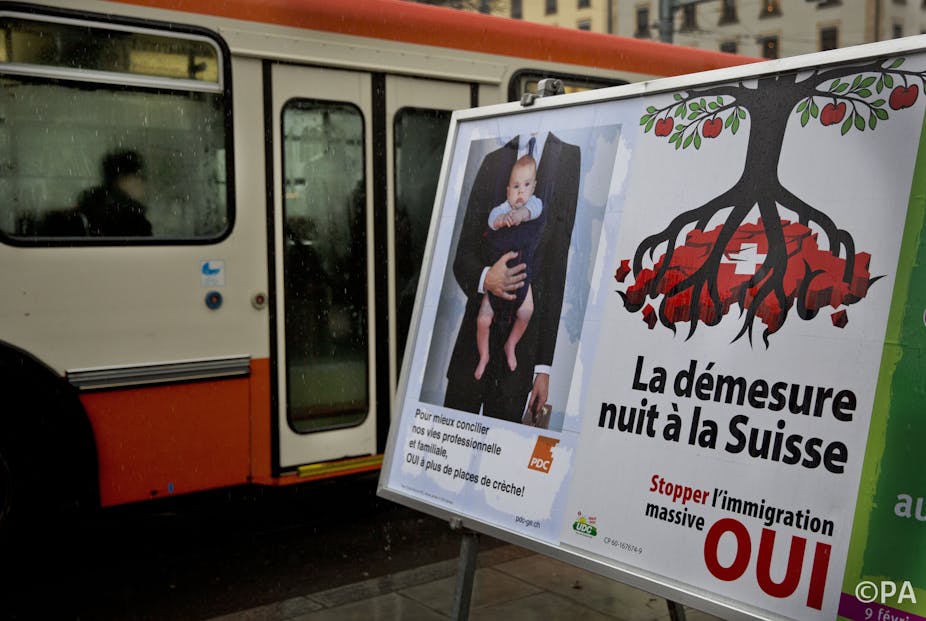Like many others, including Christoph Blocher – the de facto leader of the Yes campaign – I was surprised by the result of Switzerland’s February 9 vote on stopping “mass immigration”. Polls suggested the anti-immigrant initiative would be defeated easily enough; instead, it passed – if only narrowly.
Perhaps we should not be so taken aback, given that Switzerland has a long tradition of such xenophobic conservatism which goes back to the 1890s, when attacks on Germans and Italians started. I should also have remembered that Swiss direct democracy often produces late surges, missed by opinion polls, which drive unexpected results. Supporters of the Scottish No campaign, take note.
I was not surprised by the simplistic foreign interpretations of the result, which were a function of the prevailing ignorance of, and indifference to, Switzerland as a whole. This was a vote against foreigners and migration; but it was just as much a means of bringing down bilateral accords with EU members as an assault on foreigners per se.
Given that three quarters of Swiss voters believe in the bilateral approach, the Swiss People’s Party – which masterminded the vote – knew that it would not win a straight vote on that issue. But it knew it had a chance of winning by placing the fear of foreigners front and centre, and so it was.
This goes some way to explaining the paradoxical voting patterns. Foreigner-free rural areas voted Yes, while the big cities, where most foreigners congregate, voted No. So the vote was not the unproblematic and universal expression of national independence claimed by the Farages, Le Pens and Wilders.
At 50.3%, it was a very narrow victory indeed, showing how deeply divided the country is. Some of this division is patterned on party lines, leading some to say consensus should be set aside and the SPP left to sort out the mess it has deliberately created. The country is also divided by language groups. This always worries the Swiss, even if this time the split was simply between French and German speakers (the Italian-speaking Ticino canton recorded the highest percentage of Yes votes mainly because of local difficulties with Italian criminals, currency and workers). This division intersects with another deep divide between inward-looking rural areas and small towns and more outward-looking cities. Business is divided in much the same way.
And, finally, the decision, when implemented, will surely reinforce a potentially destabilising divide between native Swiss and a voteless, rightless and often oppressed underclass. This uneven xenophobia could well come back to haunt the Swiss. But in the meantime, with all these conflicts and disputes raging, it will not be easy to agree on any law – never mind a revised relationship with the EU.
Trouble ahead
The prospect of Switzerland and the EU growing apart will greatly damage the country’s reputation as the pioneer of a “third way” between EU membership and isolation. Equally, much supportive reaction has painted the EU as a bully likely to increase Swiss opposition by the vehemence of its reactions.
In fact, while the EU has been critical of the vote and made it clear that it considers free movement of people a fundamental right, it did not initially threaten the Swiss with any sanctions for their decision. And it has gone out of its way to make clear that there is to be no “punishing” the Swiss, so that talks on electricity and institutional structures could well come back on the agenda. This mildness has clearly annoyed Blocher, who has a political imperative to rail against excessive pressure from Brussels.
It was only when the Swiss justice minister declined to sign a protocol on free movement with Croatia, that the EU suspended talks on research and educational programmes, since both are premised on unfettered free movement. Replies to Switzerland’s latest proposals on an institutional framework and on co-operation in the electricity market have also been temporarily delayed.
Nonetheless, Switzerland will now have to negotiate with one hand tied behind its back, because its credibility as a reliable partner has been gravely impaired. Although it presently denies this, the EU now has good reason to doubt that any Swiss negotiators could now actually deliver on anything agreed in Brussels. And the question arises of what will happen if there is no treaty negotiation within the three years specified by the initiative. This is one of a number of complex and unappreciated problems which will have to be resolved.
The initial Swiss response has been to prioritise damage limitation. The government has laid down a timetable of implementing law by the end of the year, while also negotiating with Brussels, but the foreign minster has already contradicted this by promising there will be no quotas for three years, despite internal pressure to put them in place. In other words, doing a deal with the EU is already causing difficulties both internally and externally.
Swiss ministers have expressed confidence in being able to achieve a pragmatic solution, but pragmatism is precisely what the SPP does not want – it seeks total victory. The situation may come down to a new vote to write bilateralism into the constitution, which would give the government a fresh mandate and renew its credibility.
Meaningful negotiations might only be likely after this is achieved – and even then, past experience shows that forging a sensible and stable new relationship with the EU will be a long and testing process. All we can be certain of is that in the aftermath of the SPP’s breathtakingly narrow win, everything is complex, uncertain – and toxic.

